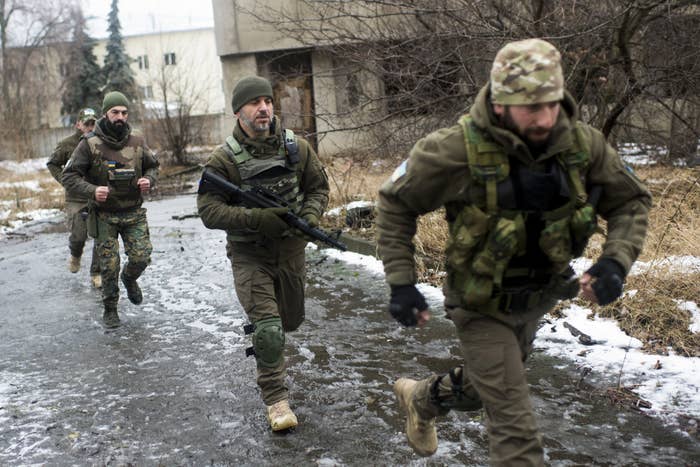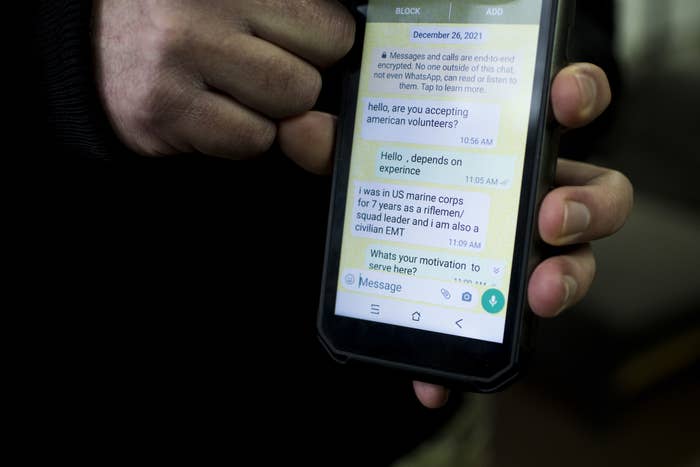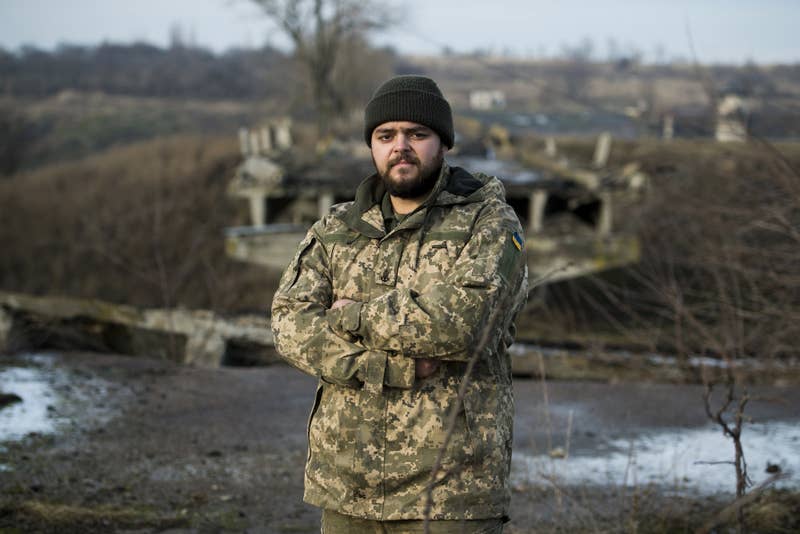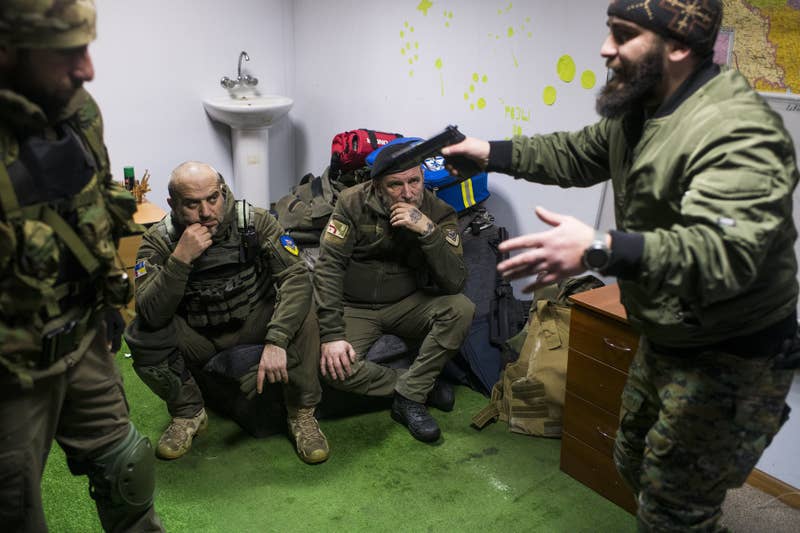Vice News
Lt. Col. Vindman: Trump ‘Absolutely’ at Fault for Russia’s Ukraine Invasion
By Cameron Joseph – February 26, 2022
“It’s because of Trump’s corruption that we have a less capable, less prepared Ukraine,” retired Lt. Col. Alexander Vindman told VICE News.
The man who played a key role in then-President Donald Trump’s first impeachment says Trump’s attempts to coerce Ukraine for a quid pro quo played a big role in undercutting the country’s ability to fight off a Russian invasion.
Retired Lt. Col. Alexander Vindman served as the director of European affairs on Trump’s National Security Council, and was on the call when Trump pressured Ukrainian President Volodymyr Zelenskyy to “do us a favor” and dig up dirt on now-President Joe Biden.
Trump was impeached by the House in late 2019 for demanding that Ukraine investigate Biden while withholding hundreds of millions of dollars’ worth of military aid the embattled country needed to defend itself against Russia. The Trump administration eventually released the aid, but not before a lengthy delay that strained the countries’ relations and clearly emboldened Putin.
Vindman was a key witness in that trial.
Trump and his allies vilified Vindman in response, smearing the 20-year Army veteran with accusations of dual loyalty because he was born in Ukraine (and implicitly because he’s Jewish). Vindman was reassigned from that job in early 2020, likely as punishment for speaking out. He’s now suing.
Vindman told VICE News on Friday that Trump’s decision to withhold the badly needed military aid hurt the country’s ability to defend itself—and emboldened Russian President Vladimir Putin. And while Vindman doesn’t let President Biden off the hook, he puts much of the blame for Putin’s invasion squarely on Trump.
“It’s because of Trump’s corruption that we have a less capable, less prepared Ukraine,” Vindman said.
This interview has been edited for clarity and length.
Cameron Joseph: For those of our readers who don’t remember every detail of the first impeachment, can you explain what you heard President Trump ask of President Zelenskyy in July 2019?
Alexander Vindman: I was coordinating a policy of support for Ukraine. It was a new government; the Zelenzskyy government won in a landslide, under a mandate to further integrate with the West. And the entire U.S. government apparatus, recognizing that we had this looming threat of Russia, decided that it was appropriate to invest in the relationship with Ukraine.
This isn’t out of thin air either. This was as a result of the national security strategy that Donald Trump himself signed in 2017. Operating under that guidance, I had put together a number of plans to support Ukraine.
Really the only person that was at odds was Donald Trump, and his really tight group of minions.
There were strange inquiries coming down on security assistance, this aid that is now proving to be critically important to Ukrainian armed forces defending themselves—and ultimately a hold on security assistance.
And it culminated in this phone call where the president attempted to extort President Zelenskyy. He demanded an investigation into Joe Biden in exchange for support to Ukraine.
Do you think Trump’s efforts at quid pro quo might have emboldened Vladimir Putin? What impact do you think they had?
There’s no question.
Based on Trump’s temperature toward Ukraine, I think Vladimir Putin believed that in a second Trump term [Putin] could have just waltzed in, NATO potentially would have been destroyed, and Ukraine would have been handed on a silver platter.
But that didn’t turn out. Instead, you had the American public reject Trump and Trumpism at least in sufficient numbers [for President Biden] to win the legal, lawful, proper election. And then the former president attempted to launch a coup and drive hyperpartisanship toward extremism and weaken the United States.
To the people who don’t necessarily follow it, it could seem far-fetched; they might tie these events to Joe Biden. But look at the timing of when this [Russian military] buildup first started. It started in the spring of 2021, just weeks after the [Jan. 6 Capitol] insurrection. Donald Trump didn’t recede into the history books, he didn’t go into quiet retirement. He continued to perpetuate this big lie and sow discord, and Vladimir Putin saw an opportunity in that.
This is 20 years building. But it was a slow creep until you get to the Trump administration, and there’s a big lurch forward. We were almost at a point of no return at that point.
By the time President Biden comes into power, you have all these vulnerabilities and opportunities. From Putin’s perspective, there’s this distracted, enfeebled superpower that’s casting its eyes further afield towards long term competition with China and the price to normalize and stabilize the relationship with Russia was a sphere of influence.
There are other things that we could have done differently as this ramped up. Now we find ourselves in a different world, in a world that we haven’t actually experienced in decades, in generations.
Do you think Putin would have invaded Ukraine if Trump hadn’t signaled that he didn’t care that much about the country? Would we be here?
Trump is the megaphone, but it’s Tucker Carlson playing on Russian airwaves. It’s Mike Pompeo cheerleading for Putin. It’s these folks that suggest that there’s a division not just within the American public but within the elites. That firm resolve for the traditional Republican Party about staking out a strong position on national security isn’t there. Those are opportunities that these folks presented.
They have blood on their hands because if they weren’t acting against America’s interests in aiding and abetting our most belligerent aggressive enemy then we may not have ended up here.
I think this is about opportunity, the vulnerability that Donald Trump and his henchmen have offered Vladimir Putin.
Trump delayed military aid for Ukraine as he tried to squeeze Zelenskyy. Do you think that had any impact on Ukraine’s preparedness for an invasion?
Absolutely.
He arrested what should have been a very, very robust relationship. The entire U.S. government was behind this idea of a magnified cooperation with Ukraine to help nurture it move forward towards the West. The pillars of that were economic, they were going to be in the energy sector, they were going to be political, to help move them on reforms and anticorruption. They were going to undergird Zelenskyy’s newfound strength to conduct these types of reforms. It was also going to be on security cooperation.
So not only did he arrest all that, but the opportunity cost for the next several years, going all the way through the rest of the Trump administration and kind of a slow ramp up for the Biden administration. We lost that time.
All that time, Ukraine could have been hardening. It could have been preparing, it could have been making itself unpalatable [for invasion]. It’s because of Trump’s corruption that we have a less capable, less prepared Ukraine.
You emigrated from Ukraine when you were a toddler and have worked professionally with folks in the country since then. Who have you talked to since the invasion began? What have you heard from them?
I don’t really have any family to speak of [left in Ukraine]. My family all emigrated; we came as refugees. We had the rest of our family come over in subsequent decades. But I do have friends and colleagues that are over there.
I haven’t spoken to many since the war started. It’s only been 36 hours, it feels like it’s been much longer than that. But it’s really quite disturbing. People are very fearful.
I’ve talked to people here that have family members there who are panicked, trying to figure out what to do, how to protect their family.
Do you think that Russia would have invaded Ukraine if Trump had taken a firmer line toward Russia and been more supportive of Ukraine?
Trump had a deep animosity toward Ukraine. We all know now about the conspiracy theories about the CrowdStrike servers, CrowdStrike being a Ukrainian enterprise, Hillary Clinton’s emails and the criticism he received for his inane commentary on Ukraine when he was a candidate, and of course Paul Manafort being tripped up. The idea that he was going to be supportive of Ukraine just seems far-fetched to me.
Put another way, if Hillary Clinton had won in 2016, do you think Putin would be in Ukraine right now?
That is a hard thing to say. Maybe not.
We’ve lurched toward confrontation because we weren’t pushing back on Russian aggression. We lurched under Trump. Without that lurch, we would still have maybe that opportunity to avert this catastrophe. And it’s not a catastrophe simply for Ukraine; it’s a catastrophe for our Euro-Atlantic alliance and for a rules-based order.
Putin was certainly concerned about Hillary Clinton taking a firmer line with him. Maybe it didn’t have to happen in 2022, but there was eventually going to be a reckoning unless we recognized Russia as belligerent and started to impose costs for its aggression.
Do you think Putin stops at Ukraine? Are you concerned he might turn his attention to the Baltic states or other NATO allies? How do you see this playing out?
There have been other conflicts, but we haven’t had this kind of massive military offensive in Europe, which is the bedrock, the core of our vital interests. It’s the combined power of the U.S. and NATO together that really keep the world on some sort of peaceful trajectory. President Putin’s own rhetoric suggests his wandering eyes will look toward Moldova and Georgia and Finland.
I think NATO allies are a high bar. Their collective defense architecture will hold firm.
What do you think could draw in American or NATO boots on the ground in actual combat?
One of the things that concerns me is the scale of this. We’re seeing just the first 36 hours. We have to remember our involvement in the Balkans [in the 1990s] was very reluctant. And it was the human catastrophe that unfolded that ultimately drew us in. So there might be a clamor from that standpoint. I think it’s unlikely, but there could be an accident or miscalculation that could draw us in. It could be a cyberattack with spillage over Ukraine’s borders into Europe and the U.S. that could draw us in.
There are different potential scenarios that are dangerous here. That’s why we should have done more.
What do you want to see the U.S. do to continue to support Ukraine militarily going forward, and do you expect that this will happen?
It’s military, informational, it’s diplomatic, and it’s economic. It’s a full-court press to isolate Russia, a full-court press to build consensus around the alliance and around our partners that feel that Russia’s actions have crossed a line. It’s a full-court press on China, frankly, to play a constructive role here as a rising superpower.
Open the spigot from the extremely wealthy West. Why are we talking about relatively paltry sums of a billion dollars? Open up the spigot, talk about rebuilding Ukraine.
On the military side, there’s more to be said there. Right now it’s particularly dangerous. There are a lot of things we could have done two days ago, maybe even with boots on the ground in a humanitarian role, that we can’t do now.
There should be a new partnership formed between NATO and Ukraine built around the notion of supporting them through this existential crisis for them. We should do something like lend-lease, basically provisioning them like we did with Russia, the Soviet Union against the Nazis, with whatever they need in order to conduct this war and defend themselves.
That doesn’t violate the rules of the road we operated under during the Cold War. We never went to blows directly with the Soviet Union, but there are multiple instances of Russia supporting our adversaries or us supporting their adversaries. Afghanistan, Korea, Vietnam are just the ones that rise to mind. The rules of the road were no direct confrontation, but indirectly supporting proxies was totally within bounds.
Once Biden was in office, what if anything could he have done to avoid this? I know you’ve been critical of how he handled this.
Yes, he could have avoided it.
They took certain things off the table. There were certain policy options they didn’t consider due to a misplaced sense of danger. Putin is masterful at preying on hopes and fears. And the saber-rattling about a bilateral confrontation is misplaced. It is a mirage. The Russians do not want a war with us. They don’t want a nuclear war. They don’t want a conventional war.
We’ve lost our nerve to a certain extent. We were practiced at not blinking at Soviet provocations in the Cold War. And we’ve forgotten. We’re facing an adversary that lives in that world, grew up in that world, uses the tools of that world, and we’re not prepared.
What scares you most going forward?
The possibility of a confrontation with Russia now is negligible. But the probability of us having a significant confrontation down the road is higher unless we hold our ground here.







 Christopher Miller is a reporter for BuzzFeed News and is based in New York
Christopher Miller is a reporter for BuzzFeed News and is based in New York






